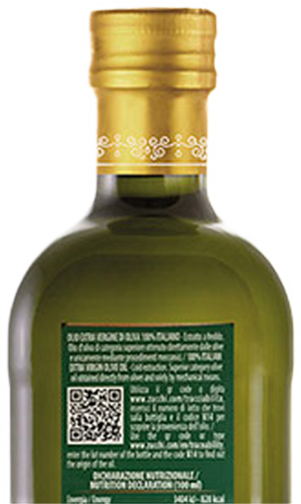Oleificio Zucchi launched the “4.0 Supply Chain” project in 2016 to maximise the value of both traceability and environmental, social and economic sustainability, as well as of product aspects relating to the nutritional characteristics of extra virgin olive oil. This process has been encouraged by digital innovation: the development of a dedicated portal has made it possible to collect a huge amount of data on all the stages in the supply chain (from olive growing to bottling and transport), in order to verify compliance with the 150 requirements of the specification (DTP 125) needed for certification.
The Zucchi 4.0 Olive supply chain
The four sustainability pillars
What are they?
Why?
The starting point for all this is a basic need: the Italian olive and oil supply chain is highly complex and extremely fragmented, with numerous producers and many steps between field and bottle. This makes product traceability difficult, creating a major disconnect between the world proposed to the consumer and what actually happens in the field. It is clear that to create a level playing field and transparency, we no longer have to focus on individual producers but on the supply chain as a whole, especially when we are looking at not merely niche production, but producers trading in excess of 9,000 tons of extra virgin olive oil.

Who is involved in Italy?
In the first phase, the data entry portal was implemented at Italian level, with access provided to all supply chain operators involved in the Oleificio Zucchi project (4 National Associations and 5 Provincial Organizations of olive growers, 5 oil pressers, 96 farms and Oleificio Zucchi itself) to certify the sustainability of the Italian extra virgin olive oil supply chain.
What are the foreign supply chains?
The Supply Chain 4.0 project has been extended to European level, mainly to the Spanish and Greek supply chains, for European Union Sustainable Extra Virgin Olive Oil supply chain certification.
What is the value added for Zucchi consumers?
The data collected in real time represents the basis for analysis, provides management insights and traces the product from field to bottle, assessing for example energy consumption, the use of plant protection products, the water footprint (WFP), the biodiversity index, etc. and is also integrated with the company’s ERP and logistics platforms, to cover the entire product life cycle for every single bottle produced.
What contribution has digitalization made?
Digital technology also contributes to increasing the transparency of communication with the end consumer, who can access all available information about the extra virgin olive oil they have purchased and trace its origin by scanning the QR code on the bottle.

Zucchi supply chain
sustainability pillars
-
sustainability
Environmental
A structured set of good agricultural practices with the minimum requirement of integrated farming, which uses as environmental indicators climate change, resource depletion, water use, eco-toxicity, eutrophication and acidification processes, soil use, fossil and mineral resource depletion, ozone layer thinning and the formation of photochemical smog. There is a special focus on biodiversity indicators, with biomonitoring of the soil, water and air.
-
sustainability
Economic
We develop a fair and shared model: our suppliers, which are associations of farmers that grow high quality crops, receive a fair economic return on their work, and all players in the supply chain comply with rules and good practices defined in DTP 125 (Product Technical Specification 125) for total control of the quality of the sustainable EVO.
-
sustainability
Social
Almost 190 stakeholders in the supply chain work on a daily basis to pool experiences and continuously improve sustainability, sharing tradition, know-how and technology as an integral part of the social capital. Training, sharing and communicating values on an ongoing basis ensures professionalism and better skills and techniques, which is why ours is a responsible and supportive model.
-
sustainability
Nutritional
We have an ongoing commitment to identifying and selecting EVO oils with specific product category, nutritional and health parameters, to improve the quality of the product we offer every day. The characteristics of our oils are described on the label for maximum transparency and reliability.